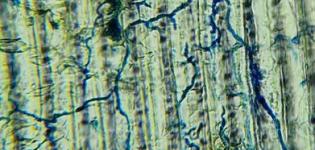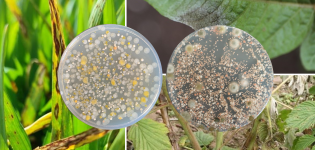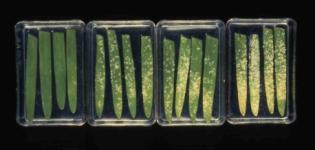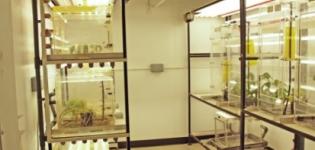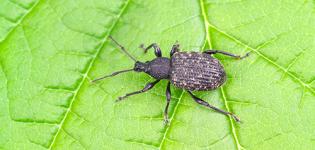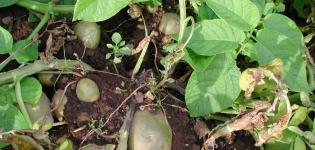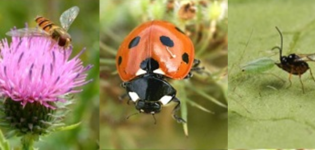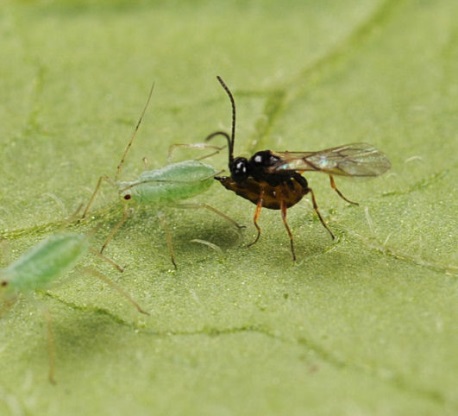 Many insect herbivores rely on symbiotic bacteria for their survival. These ‘hidden players’ residing in insect tissues can affect fitness of the insect host. For example, some insect species show increased resistance to natural enemies when certain ‘protective’ symbiotic bacteria are present, which could make it more difficult to control pest infestations.
Many insect herbivores rely on symbiotic bacteria for their survival. These ‘hidden players’ residing in insect tissues can affect fitness of the insect host. For example, some insect species show increased resistance to natural enemies when certain ‘protective’ symbiotic bacteria are present, which could make it more difficult to control pest infestations.
Under favourable conditions, parasitoid wasps can be effective natural enemies of aphids and they are frequently deployed to control infestations in glasshouses and polytunnels. Parasitoid wasps insert their eggs into the aphid body, from which a larva emerges that consumes and eventually kills the aphid. However, in the presence of certain protective symbionts, the parasitoid egg fails to develop.
Our recent research using the braconid parasitoid wasp Aphidius ervi has shown that pea aphids with a dual symbiont infection (Hamiltonella defensa and X-type symbiont) are highly protected against parasitism and superparasitism (when aphids receive two or more parasitoid attacks). By contrast, parasitism of potato aphids can fail due to innate aphid resistance. By understanding the mechanisms underlying aphid resistance to parasitism, researchers can suggest strategies to improve the efficacy of natural enemies.
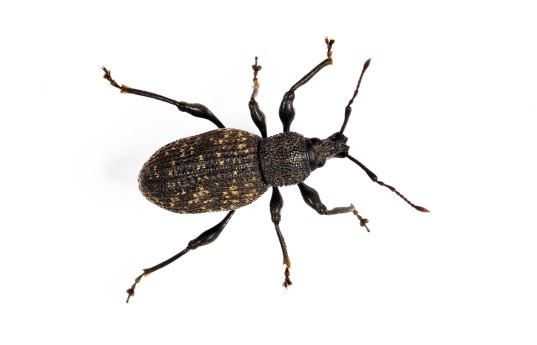 In a studentship project jointly supervised by Harper Adams University, we are exploring whether vine weevil lineages differ in fitness and susceptibility to natural enemies, and whether this relates to their bacterial symbiont community. The vine weevil, Otiorhynchus sulcatus, is a significant pest in soft fruit plantations and ornamental nurseries, causing damage to strawberry and raspberry production estimated at £18 million annually. A key to successful management of vine weevil could lie in a better understanding of the microbial ecology of vine weevil populations. The project findings will be used to suggest pest management strategies for control of larvae and adult insects.
In a studentship project jointly supervised by Harper Adams University, we are exploring whether vine weevil lineages differ in fitness and susceptibility to natural enemies, and whether this relates to their bacterial symbiont community. The vine weevil, Otiorhynchus sulcatus, is a significant pest in soft fruit plantations and ornamental nurseries, causing damage to strawberry and raspberry production estimated at £18 million annually. A key to successful management of vine weevil could lie in a better understanding of the microbial ecology of vine weevil populations. The project findings will be used to suggest pest management strategies for control of larvae and adult insects.
Plant traits for pest and disease control in soft fruit are a tool in the Soft fruit IPM Toolbox.
Contact Alison Karley for further information.
Publications
- Clarke HV, Cullen D, Hubbard SF & Karley AJ. Susceptibility of Macrosiphum euphorbiae to the parasitoid Aphidius ervi: larval development depends on host aphid genotype. Entomologia Experimentalis et Applicata (in press).
- Donald KJ, Clarke HV, Mitchell C, Cornwell RM, Hubbard SF & Karley AJ. 2015. Protection of Pea Aphids Associated with Coinfecting Bacterial Symbionts Persists During Superparasitism by a Braconid Wasp. Microbial Ecology 71(1), 1-4.
